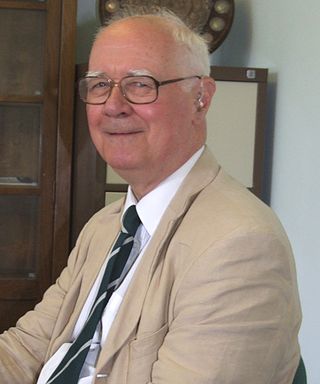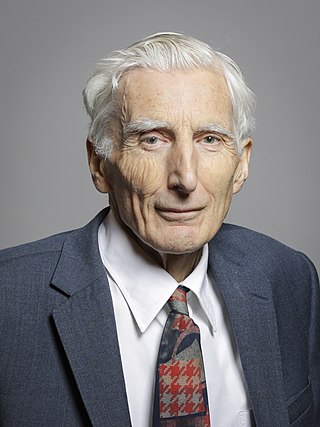Related Research Articles

Michael Faraday was an English scientist who contributed to the study of electromagnetism and electrochemistry. His main discoveries include the principles underlying electromagnetic induction, diamagnetism and electrolysis. Although Faraday received little formal education, as a self-made man, he was one of the most influential scientists in history. It was by his research on the magnetic field around a conductor carrying a direct current that Faraday established the concept of the electromagnetic field in physics. Faraday also established that magnetism could affect rays of light and that there was an underlying relationship between the two phenomena. He similarly discovered the principles of electromagnetic induction, diamagnetism, and the laws of electrolysis. His inventions of electromagnetic rotary devices formed the foundation of electric motor technology, and it was largely due to his efforts that electricity became practical for use in technology.

John Charlton Polkinghorne was an English theoretical physicist, theologian, and Anglican priest. A prominent and leading voice explaining the relationship between science and religion, he was professor of mathematical physics at the University of Cambridge from 1968 to 1979, when he resigned his chair to study for the priesthood, becoming an ordained Anglican priest in 1982. He served as the president of Queens' College, Cambridge, from 1988 until 1996.

Martin John Rees, Baron Rees of Ludlow, is a British cosmologist and astrophysicist. He is the fifteenth Astronomer Royal, appointed in 1995, and was Master of Trinity College, Cambridge, from 2004 to 2012 and President of the Royal Society between 2005 and 2010. He has received various physics awards including the Wolf Prize in Physics in 2024 for for fundamental contributions to high-energy astrophysics, galaxies and structure formation, and cosmology.
Owen Jay Gingerich was an American astronomer who had been professor emeritus of astronomy and of the history of science at Harvard University and a senior astronomer emeritus at the Smithsonian Astrophysical Observatory. In addition to his research and teaching, he had written many books on the history of astronomy.

Kenneth Raymond Miller is an American cell biologist, molecular biologist, and Professor Emeritus of Biology at Brown University. Miller's primary research focus is the structure and function of cell membranes, especially chloroplast thylakoid membranes. Miller is a co-author of a major introductory college and high school biology textbook published by Prentice Hall since 1990.

Michael Ruse is a British-born Canadian philosopher of science who specializes in the philosophy of biology and works on the relationship between science and religion, the creation–evolution controversy, and the demarcation problem within science. Ruse currently teaches at Florida State University.

Alister Edgar McGrath is a Northern Irish theologian, Anglican priest, intellectual historian, scientist, Christian apologist, and public intellectual. He currently holds the Andreas Idreos Professorship in Science and Religion in the Faculty of Theology and Religion, and is a fellow of Harris Manchester College at the University of Oxford, and is Professor of Divinity at Gresham College. He was previously Professor of Theology, Ministry, and Education at King's College London and Head of the Centre for Theology, Religion and Culture, Professor of Historical Theology at the University of Oxford, and was principal of Wycliffe Hall, Oxford, until 2005.
Simon Conway Morris is an English palaeontologist, evolutionary biologist, and astrobiologist known for his study of the fossils of the Burgess Shale and the Cambrian explosion. The results of these discoveries were celebrated in Stephen Jay Gould's 1989 book Wonderful Life. Conway Morris's own book on the subject, The Crucible of Creation (1998), however, is critical of Gould's presentation and interpretation.
Mehdi Golshani is a contemporary Iranian theoretical physicist, academic, scholar, philosopher and distinguished professor at Sharif University of Technology. He is also member of Iranian Science and Culture Hall of Fame, senior fellow of Academy of Sciences of Iran and a founding fellow of the Institute for Studies in Theoretical Physics and Mathematics. He is a former member of the Supreme Council of the Cultural Revolution.

John F. Haught is an American theologian. He is a Distinguished Research Professor at Georgetown University. He specializes in Roman Catholic systematic theology, with a particular interest in issues pertaining to physical cosmology, evolutionary biology, geology, and Christianity.

Michał Kazimierz Heller is a Polish philosopher, theoretical physicist, cosmologist, theologian, and Catholic priest. He is a professor of philosophy at the Pontifical University of John Paul II in Kraków, Poland, and an adjunct member of the Vatican Observatory staff.
Max Lynn Stackhouse was the Rimmer and Ruth de Vries Professor of Reformed Theology and Public Life Emeritus at Princeton Theological Seminary. He was ordained in the United Church of Christ and was the president of the Berkshire Institute for Theology and the Arts.
Elaine Storkey is a British philosopher, sociologist, and theologian. She is known for her lecturing, writing and broadcasting.

Dr. Denis Alexander has spent 40 years in the biomedical research community. He is an Emeritus Fellow of St. Edmund’s College, Cambridge and an Emeritus Director of the Faraday Institute for Science and Religion, Cambridge which he co-founded with Bob White in 2006.
The Trotter Prize is awarded at Texas A&M University and is part of an endowed lecture series. It is awarded "for pioneering contributions to the understanding of the role of information, complexity and inference in illuminating the mechanisms and wonder of nature" and includes The Trotter Lecture which "seeks to reveal connections between science and religion, often viewed in academia as non-overlapping, if not rival, worldviews.

Ronald Alfred LaskeyFLSW is a British cell biologist and cancer researcher.
Graham Paul Farmelo is a biographer and science writer, a Fellow at Churchill College, University of Cambridge, U.K., and an adjunct professor of Physics at Northeastern University, Boston, U.S.A. He is best known for his work on science communication and as the author of The Strangest Man, a prize-winning biography of the theoretical physicist Paul Dirac. He lives in London.
The Institute for Orthodox Christian Studies (IOCS) is a theological college in Cambridge, England. It works in collaboration with the University of Cambridge and Anglia Ruskin University and awards its degree programs through these universities. IOCS is the only Christian Orthodox institute for higher education in the UK and the only academic institution teaching the Orthodox faith in English anywhere in western Europe. Along with other theological colleges in Cambridge, it is a member of the Cambridge Theological Federation. The institute adopts a holistic approach to learning that integrates academic study with a liturgical life.

The group Science, Reason and Faith is formed by teachers at the University of Navarra. Its purpose is to promote the interdisciplinary study of issues related to science, philosophy and religion. The activities of the group cover three closely related areas: research, teaching and public engagement.
References
- ↑ Grant profile Archived 2012-01-11 at the Wayback Machine , John Templeton Foundation
- ↑ ""Faraday Staff", accessed 4 Dec 2020". www.faraday.cam.ac.uk. 2001-08-24. Archived from the original on October 1, 2020. Retrieved 2010-12-12.
- ↑ ""Faraday Staff", accessed 4 Dec 2020". www.faraday.cam.ac.uk. 2001-08-24. Archived from the original on 2010-12-18. Retrieved 2010-12-12.
- ↑ About us Archived 2009-12-13 at the Wayback Machine , Faraday Institute
- ↑ Schloss, Jeffrey, and Murray, Michael, The Believing Primate: Scientific, Philosophical, and Theological Reflections on the Origin of Religion, p. ix, Oxford University Press US (2009), ISBN 0-19-955702-0, ISBN 978-0-19-955702-8, accessed 17 November 2009
- ↑ God, Evolution and Charles Darwin [ dead link ], Nick Spencer (director of studies at Theos), The Times 17-Sept-2008
- ↑ New Books, Papers & Other Resources Archived 2010-02-23 at the Wayback Machine Science and Religion News, International Society for Science and Religion
- ↑ About – People, Test of Faith website, Faraday Institute
- ↑ "Newton in Three Dimensions", Science , 326, p. 937, 13 November 2009, accessed 18 November 2009
- ↑ Ball, Philip (2011). "Theatre: Newton's rainbow". Nature. 472 (7342): 168. Bibcode:2011Natur.472..168B. doi: 10.1038/472168a .
- ↑ "Let there be a Big Bang," The Tablet , 16 April 2011, accessed 23 August 2012]
- ↑ "Cambridge conference considers 'sustainability in crisis'," Ekklesia , 30 September 2011, accessed 23 August 2012
- ↑ Alexander, Denis (2009-07-16). "Science and religion: Squabbling but loving cousins". The Telegraph. Archived from the original on 2009-07-19.
- ↑ Vallely, Paul (2008-10-11). "Religion vs science: can the divide between God and rationality be". The Independent. Retrieved 2019-07-30.
- ↑ Alexander, Denis (25 August 2001). "Science in search of God". The Guardian.
- ↑ The divine is in the detail Times Higher Education 26-June-2008
- ↑ Academics to debate God and Science Irish Examiner 21-Apr-2007
- ↑ Can Christianity Warm Up to Darwin? Fox News 27-Oct-2009
- ↑ Darwin and the Church Public Radio International 12-Feb-2009
- ↑ "Faraday Papers site". St-edmunds.cam.ac.uk. Archived from the original on 2010-11-29. Retrieved 2010-12-12.
- ↑ McGrath, Alister E. (2009-12-07). Science and Religion: A New Introduction. John Wiley and Sons. p. 234. ISBN 9781405187909.
- ↑ The Edge of Reason?: Science and Religion in Modern Society. Continuum. 2008-11-22. p. 17. ISBN 9781847062185.